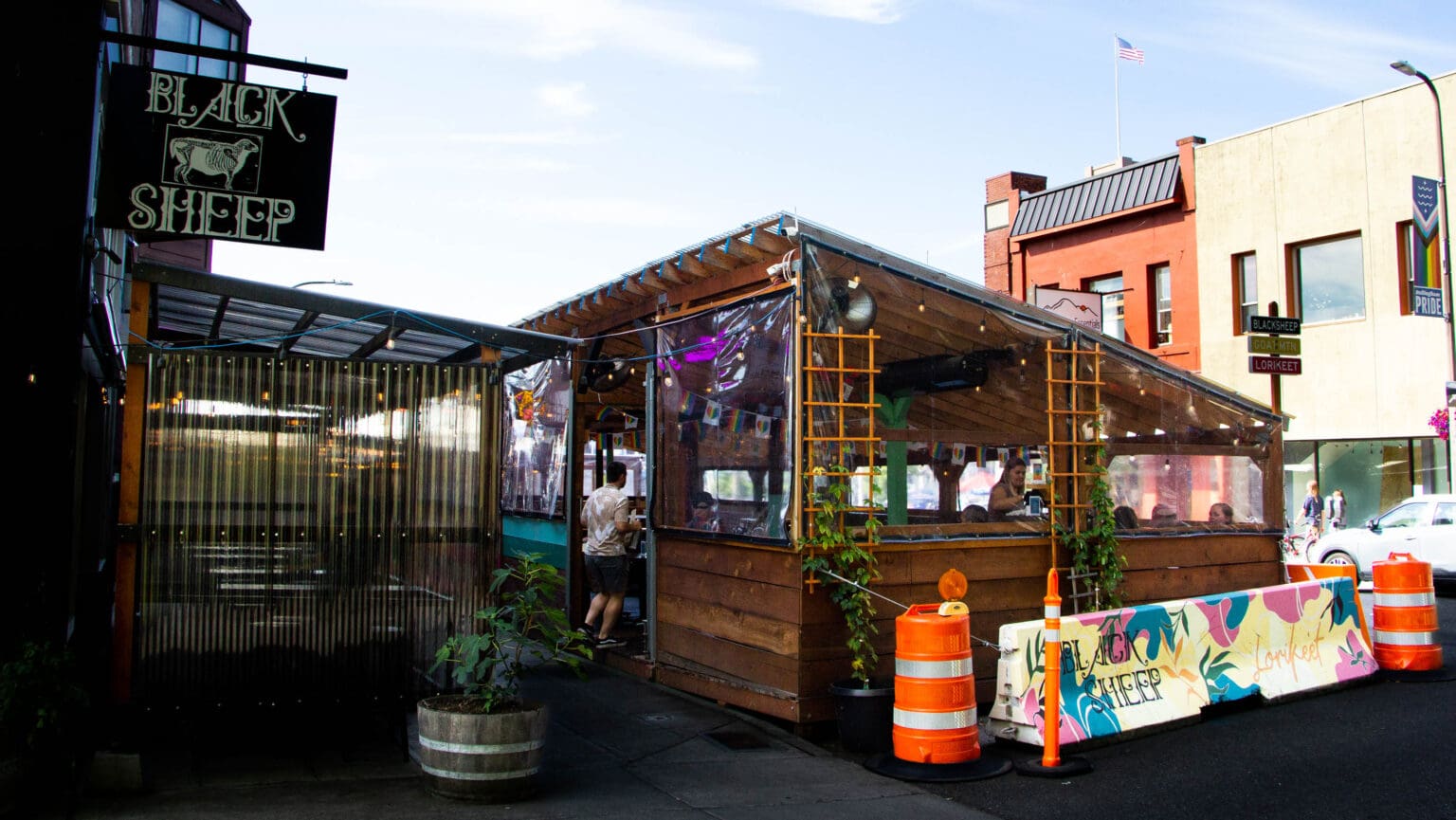Some restaurant and bar owners in Bellingham are experiencing sticker shock but say they are willing to absorb much higher fees to continue operating the outdoor-dining spaces known as “streateries,” which have taken over dozens of parking spaces downtown and in Fairhaven.
What has been a nominal annual fee of $50 could become thousands of dollars, if the Bellingham City Council approves recommendations in a report on the streatery program, released in July.
Based on a formula involving per-square-foot commercial lease rates plus the leasehold excise tax (a property tax for use of public spaces), the city’s Planning and Community Development Department recommends increasing the annual permit renewal fee for streateries from a flat $50 to about $840 per occupied parking space. The fee can be less, if the streatery doesn’t take up full parking spaces.
Upfront permit costs can be as low as $150 and generally are less than $1,000.
‘Supremely against’ fee hike
Estelle in Fairhaven opened its outdoor-dining area just in time for Ski to Sea weekend and the Fairhaven Festival two months ago.
The arrangement at Estelle is more sidewalk café than streatery or “parklet,” as the city sometimes refers to them. Estelle’s outdoor space is not enclosed, but it takes up a portion of five diagonal parking spaces. Under the new fee structure, Estelle’s streatery would cost $1,994 a year, according to a city calculation.

Co-owner Aaron Saurer said he probably would pay the higher fee, even though he is “supremely against them raising it” — especially since it amounts to a forty-fold increase in the renewal fee, and no one at the city told him this change might be coming.
City planners also propose higher standards for safety and design: don’t use pallets or sheet plastic, keep the parklets clean and landscaped, and stay clear of storm drains and fire hydrants, among other requirements.
‘Worth it’
The streatery at Galloway’s Cocktail Bar on 10th Street in Fairhaven was built to last. While the city’s streatery report says that most businesses have paid “more than $20,000” to construct their outdoor-dining parklets, Galloway’s General Manager Allison Sutherland said the bar invested $50,000 to $60,000 on its streatery, going so far as to hire an architect and engineer.
“We were told what changes were going to happen, so we built with those in mind,” Sutherland said.
Like Saurer at Estelle, Sutherland said Galloway’s would pay the new streatery fee, even as she called the significant hike “unfortunate.”
The bar’s enclosed parklet, which occupies three parking spaces, could cost Galloway’s about $2,500 a year for permit renewal.
“It doubles our occupancy and is worth it,” Sutherland said. “It’s definitely a part of our footprint now. We don’t want to lose it, so we will pay it.”
Streateries have been allowed in Bellingham since 2019 and took off during the COVID-19 pandemic when indoor dining was prohibited. The city’s report says about 30 streateries were permitted from March 2020 to the end of 2022, which wouldn’t include Estelle’s outdoor seating, approved this year.

While some establishments have embraced the outdoor spaces as a way to grow their businesses, others decided streateries weren’t right for them.
Fiamma Burger on Railroad Avenue downtown removed their parklet recently, restaurant supervisor Wren Gauthier said, citing inappropriate uses of the space by non-customers.
“They were flipping the tables,” Gauthier said.
Camber Coffee had an unpermitted parklet that took up a single parking space on Holly Street, at its intersection with Bay Street downtown. Under the proposed new rules, Camber’s streatery might not have been allowed. The city recommendation includes a national standard that requires siting streateries at least one parking space away from an intersection.
Camber didn’t keep its streatery long enough to test the proposed rules.
“They were given the opportunity to apply for a permit and bring it into compliance (including engineering) but decided to remove it instead,” said Darby Galligan, a senior planner with the city.
Camber General Manager Gloria Baldwin said the coffee shop hastily erected its streatery “at the height of the pandemic, in 2020.”
“We didn’t expect it to last longer than six months,” she said.
As the city started imposing regulations, Camber decided it wasn’t worth the trouble to keep its streatery, Baldwin said. Besides, she said, the shop already had patio-style seating on the sidewalk.
“We just decided it wasn’t worth the cost,” she said.
The city council will likely begin deliberating on the new fees for streateries in August or September, Galligan said. Officials are taking public comment on the proposed fee, safety and design changes on the Engage Bellingham website.
A previous version of this story gave incomplete information about how the annual streatery renewal fee would be calculated. The story was updated at 2:57 p.m. Friday, Aug. 4 to correct this information and the projected fee for Estelle. Cascadia Daily News regrets the error.




